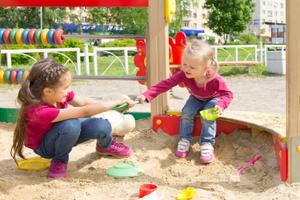I remember someone once saying to me that not many kids end up in hospital as a result of sibling rivalry - and I think that is probably right. The odd fight here or there is par for the course and likely to happen to kids in nearly every family I know. And, I think that generally we probably worry too much about things that can sort themselves out. I certainly remember a time or three when we had to say to our kids, “If you want to fight that’s okay, but can you go outside and do it? Usually that ended-up in one of two things happening: one, that the fight just stopped there and then, this being particularly the case when it was pouring outside!, Or, two, they would go outside and they would get interested in something else. But here’s the thing often we didn’t have to worry about this kind of rivalry, unless it morphed into something else, like bullying or using menace, where a bigger kid lorded it over their littler sibling. It’s all a matter of degrees of course, about what crosses the line, but I think we all know when too much is too much. That’s when something does need us to been done. So, the line then, is where someone goes and intentionally hurts another - and where they do this as a pattern. Sometimes do unexpected things out of the blue. That’s not a pattern. It’s the same with children using their force to menace others, whether that’s face-to-face or on social media. Sibling rivalry like other forms of rivalry I would not worry-about until it morphs into something bigger. You have bigger fish to fry than sibling rivalry like helping them mature and getting things in proportion – something that kids and teenagers struggle with nearly every day Bullying Last time I chatted with you about sibling rivalry. The upshot in that article was that unless their behaviour looks like it’s going to put them in hospital, you shouldn’t worry about it too much! I grew up with three brothers and they teased me from time to time, but I also learnt to serve it back up to them. I wouldn’t call what they did as bullying; I didn’t even know what that term meant back then. But I do know this. I wasn’t slayed by what they taunted me with. Not that they did it all the time but I do remember being teased about wetting the bed and them threatening to tell my friends. I think I was about 7 then. Is that or was that bullying? I don’t know that it was really. I know that bullying can be mistaken for sledging and then the question is what is a reasonable amount of sledging in a family of four boys? It seems to me that we need to be careful not to sanitise life to an extreme. Sure bullies exist and they need to be stood up against. I’ve had two managers, who was an outright Master in thuggery, let alone having a degree in bullying, and she did not like being stood up to by me. But you deal with things as they come along. As far as bullies go though I think it’s just as important to spend more time with our kids to help them get things in proportion and learn when to walk and when to stand your ground. It seems to me that that requires flexibility. While there are and always be people who act like bullies the important things for our kids to do is knowing when and how to brush it off when they need to - and move on. And, if they can’t or shouldn’t move on they need to work out how to stand up against a bully when they really need to. Discipline The first thing that needs to be said about children’s difficult behaviour is that, more often than not, it’s an emotional overreaction. Although our children don’t necessarily see it that way, we do. If you look at children behaving poorly, it’s clear that: 1. they are very emotional 2. they just don’t know what to do to manage their emotions. Part of growing up is developing an ability to control our strong feelings. One writer who has attempted to define what it is to ‘grow up’ is Scott Peck. In the 1970s, Peck wrote a book called The Road Less Travelled in which he described how we mature as adults and what we would be doing if we were fully mature. Essentially, he demonstrated that developing maturity is partly about how well we balance our emotions in proportion to our experiences Children experience their own frustrations, but because their brains are still developing they interpret events differently. What children interpret as ‘frustrating’ may not be apparent to an adult. Working out what’s really frustrating and what’s not can be a tough ask when you’re a child. Clearly, not every situation is a 9/10 event, but what we often see in children who behave poorly is a disproportionate reaction to something as innocuous as a ‘Later …’ or a ‘Not now …’ from a parent. The children I have seen who have marked behaviour problems have often developed a pattern of letting their emotions fly. They haven’t learnt how to manage their strong feelings, or pull back from the emotional brink. I believe that our children’s ability to harness their feelings depends partly on their stage of development (meaning that we would expect them to develop this ability as they get older) and partly on learning the skills to deal with their frustration. And they can learn these skills from you and me .

Sibling rivalry
Children
Parenting
Sibling rivalry
By Michael Hawton
26th February, 2017

About the author
Michael Hawton is the founder of Parentshop, providing education and resources for parents and industry professionals working with children. He has authored two books on child behaviour management: Talk Less Listen More and Engaging Adolescents.
